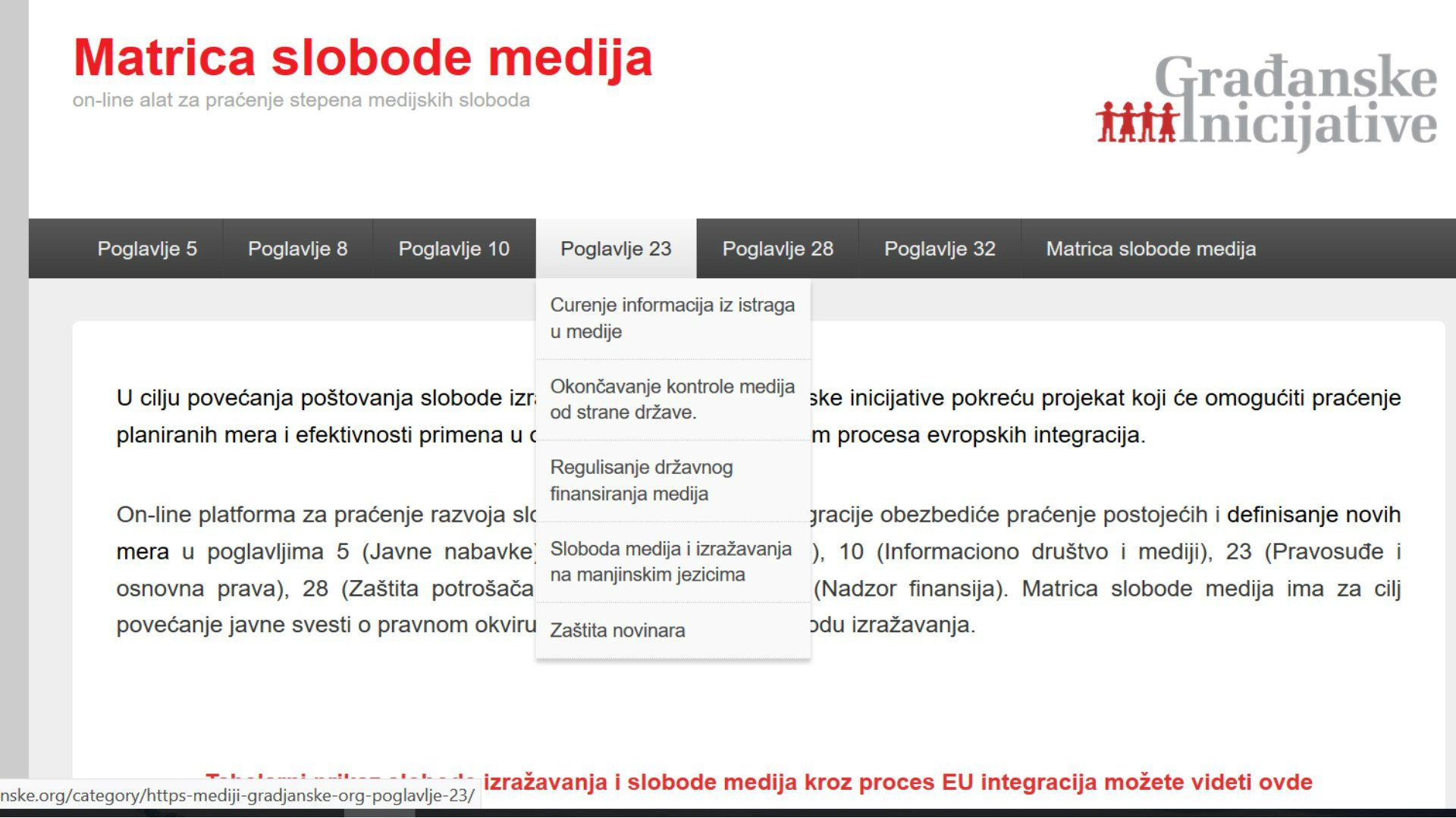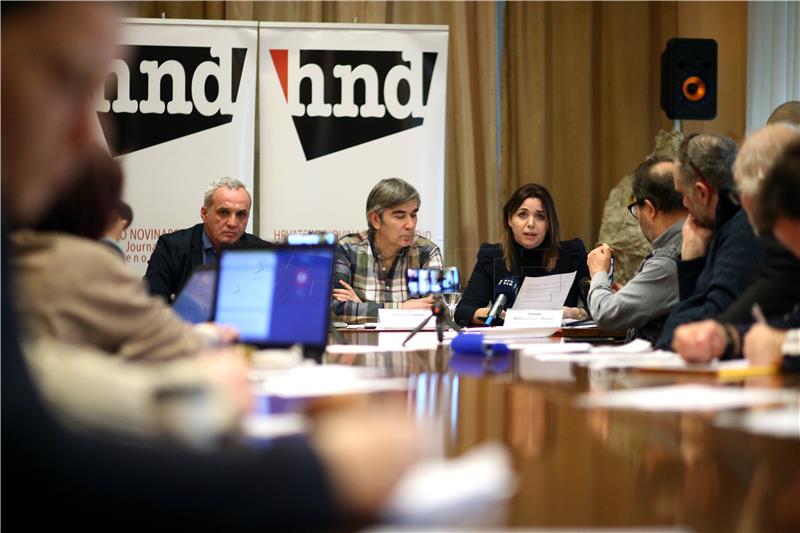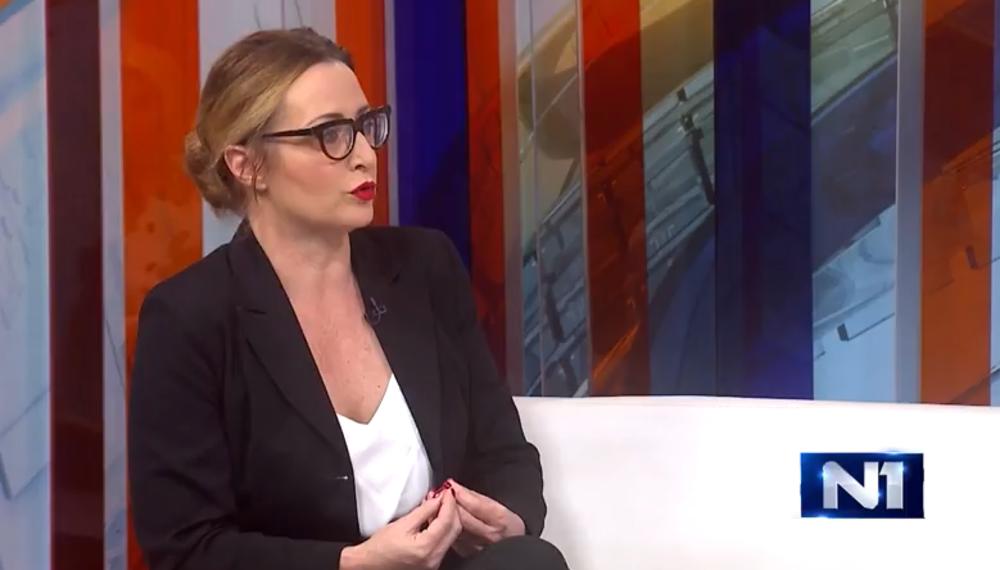BELGRADE, 29.12.2018. – Where media ethics is concerned, 2018 was not fundamentally different from previous years, but what was noticeable was that some aspects of professional standards and some items of the Serbian Journalists’ Code of Ethics were violated far more frequently than before. The conclusion is backed by statistics: in the regular annual press monitoring, conducted by the Press Council for the fourth consecutive year, August and September 2018 were months with a much bigger number of Code violations than ever before. While the previous “record holder” was April 2016 (the month in which singer Jelena Marjanovic was murdered and then torn apart in the media) with 616 violations, August 2018 had 718, while September had 722. Since the results for October, November and December have yet to be unveiled, it is quite possible that even these records will be broken very soon.
LIE TO ME, AND NO NEED TO BE GENTLE
What is most directly linked to the political atmosphere in the domain of media ethics is media content that violates the basic rules of the Code: the ones that pertain to the obligation of truthful reporting. The pro-regime media accuse opposition leaders of a variety of things on a daily basis – from cases of multimillion fraud and criminal acts to stealing garage parking spots, and practically not a single one of those affairs has been taken to the end in the sense of an epilogue in court or at least a media resolution. It is also difficult to count the thunderous announcements of civil and all other wars, equally regular, which turn out to be complete lies in a day or two. The readers are probably already used to all those things – just like they are used to always the same guests on TV shows, lists of forbidden interlocutors etc.
On the other hand, there is increasing media content in which the lies are slightly better concealed and harder to detect. First and foremost, editors resort more often to omitting certain facts: for example, there has been practically no mention of the December civil protests in the news programs of the public service; a single word hasn’t been written in the press or uttered on Belgrade’s city television about the hundreds of public transportation company drivers who have emigrated and the hundreds who have replaced them without appropriate preparation and training. Even when it is not directly connected with the political situation, this omission is in fact highly political. For example, all the media reported with a lot of fanfare on the electronic boards and diaries for first and fifth graders, as another in a line of media medals the current government has been decorated with. What wasn’t said, however, was that first graders cannot use those boards at all because they have not been harmonized with the curriculum, and instead serve for putting up drawings: that piece of information would mean that someone close to the government had probably “gotten a piece” of the job, which is an extremely dangerous and unwanted subject for the “suitable” media.
The biggest lies, and the ones easiest for the general public to swallow, pertain to economic well-being. The opening of factories and announcements of the arrival of major investors were regular topics, whereas stories of abuse of workers, strikes, harassment in the workplace etc. appeared only in a small number of surviving independent media. The Kurir daily, which ended 2017 as a self-proclaimed standard-bearer of media freedoms, while it (again) ended 2018 as one of the strongest pro-regime media, published the story of one Grandma Nada, who had picked up her pension payment but “couldn’t believe her eyes” when she saw she’d gotten 1,500 dinars more than the previous month. In this particular case, provisions of the Code that prohibit political advocacy (Chapter 2, item 1) and the obligation of publicizing all information that might influence the readers’ opinion (Chapter 5, item 3) were certainly violated, while many others could be discussed further (since it is questionable whether Grandma Nada actually exists, whether she is really ecstatic etc.). This is, in fact, the most perfidious form of political propaganda that is difficult to identify, because it is wrapped up in a readable and interesting “packaging.” Such and similar media content was more present than ever before.
STRENGTHENING SUZANA’S CAPACITIES
However, instead of doing everything to at least rein in the shameless lying by the pro-regime media, the authorities this year decided to institutionally rein in everyone else. The first one to speak out on the subject of fake news was Nenad Popovic, the minister in charge of innovation and technological development (?!), who said on June 26 that he had forwarded a proposal to President Aleksandar Vucic for the forming of a task force for defense against fake news. Allegedly, the then current piece of fake news on poisoned water “is just a test for some future fake news,” thus it is necessary to establish “a legal and institutional framework so that citizens are not exposed to fake news.” The expert public’s reaction was such that this unfortunate and bizarre idea was very quickly forgotten.
But just a few months later, at a session of the Club of Venice, Vucic’s media adviser Suzana Vasiljevic – a person far more powerful and dangerous than Minister Popovic, who has for years been systematically working on degrading, enslaving and destroying the freedom of speech and media – repeated the idea. It was precisely her who noted in the presence of the international public that “the media environment in Serbia is susceptible to various influences” and “often acts very irresponsibly,” and that (probably because of all that) Serbia “is strengthening capacities for the early detection of fake news.”
Both Popovic and Vasiljevic conveniently forgot to mention that fake news was in the greatest possible extent spread precisely by the media under their direct and highly tangible influence: according to research conducted by the Fake News website (fakenews.rs) for last year, which was presented on January 30, 2018, as many as 362 fake news items were published on 302 front pages of the Informer newspaper. On the other hand, not even such statistics prevented the commissions for financing media content of public interest to grant hefty sums from the budget to none other than Informer and Srpski Telegraf (proven to be the biggest violators of professional standards, to put it mildly).
ILLUSTRATION OF POLITICS
The Ilustrovana Politika weekly in 2018 also found itself in the anthology of disregard for professional standards. The magazine that even during the dark years of the Politika publishing company offered diverse, interesting reading material and reports, became a political tool in the hands of deputy editor Goran Kozic – also known as one of the brightest stars of Slobodan Milosevic’s media sky. Kozic transferred his personal, political and ideological wars to Ilustrovana Politika. The sporadic persecution of this or that individual (with a particular animosity toward Ljiljana Smajlovic), eventually materialized on two horrific front pages: one showing an enraged dog alongside the front pages of the Vreme and NIN weeklies and the Danas daily, and another with an artistic image doctored to show Ljiljana Smajlovic breastfeeding Veran Matic (?!).
Although the state leadership and the usually quiet Ministry of Culture and Information reacted instantly, there were no actual consequences. Suzana Vasiljevic resigned as a member of the Politika Supervisory Board (which probably affected only her pocket), while Kozic resigned from the editorial staff after the second front page, apologizing “to all whom my style of writing has offended or humiliated,” but also to “my family, my children and the state leadership (?!).” In this case, however, it is not important whether the omnipotent Suzana will sit on this or that board, and whether Kozic will be the editor of this or that media outlet – the main question and main problem is the lack of a normal political environment for the professional operation of the media, an environment that would disable the existence of the kind of front pages and articles Ilustrovana Politika has “graced” us with. And there we reach the point where respect for or violation of the Code is no longer important, but rather the creation of elementary conditions for the freedom of speech and media. That, again, is something that journalists’ associations should deal with – if they have decided to take part in the so-called “dialogue with the authorities,” i.e. with those who wield very specific, very tangible and for the time being pretty deadly power over the media.
BAD WORDS AND DIRTY IMAGES
Over the past few years, and this year in particular, the vulgar language taken from the street and reality shows has moved onto the “serious” newspaper pages and into “serious” media content. Thus disregard for the culture and ethics of public speech (as identified by the Journalists’ Code in Chapter 4, item 6) was registered not only in entertainment sections, but also in political squabbling, open letters – which were all the rage this year, and articles on current political bickering. The words “scum,” “madman,” “idiot,” “whore” were traditionally present, but now various bodily fluids (blood, saliva and – for now only on the pages devoted to show business – sperm), excrement, urine, pubic hair etc. have been added to the mix.
Although the Journalists’ Code strictly prohibits it, the media have been used for persecuting political opponents, but also in personal clashes with people who are less familiar to the public. The best known story of the sort in 2018 involved a female judge from Vranje, whom the tabloids dragged around on their front pages for days as immoral and prone to various vices – with illustrations obviously taken from her cell phone and private archives. However, since no one ever managed to show and prove what that woman was guilty of (except being good-looking and the fact that she likes to be photographed in provocative poses – which, again, is no one else’s business but her own), the story simply vanished. Several months later, a whole other news story revealed what that had all been about: the disgraced judge had clashed with a man who had presented himself as an adviser to Aleksandar Vucic and thus defrauded people. When this “adviser” was exposed, it turned out that he had been the one who had handed the compromising photographs to the tabloids. In that situation, the media seriously violated the right to privacy (Chapter 7, item 1), the obligation of using only honorable means in their work rather than stolen images and recordings (Chapter 8, item 1), but above all – the obligation prescribed by the Code to be especially cautious when dealing with sources who have their own, more or less hidden agenda (Chapter 5, item 2).
AT THE CEMETERY GATES
Except on the pages reserved for politics, the biggest number of violations of professional standards occurred in the crime news and show business sections, i.e. (traditionally) in the domain of violation of the presumption of innocence and increasingly in the domain of violation of the right to privacy.
At this time one may freely say that the right to presumption of innocence no longer applies in the Serbian media: even when they do not reveal the first and last name of a criminal suspect, the media regularly reveal at least one detail which can help to determine the person’s identity (photograph of their house, exact address, first and last name of their spouse or close relative etc.). What is particularly worrisome, especially due to the growing number of pedophilia reports, is the fact that oftentimes when the identity of the alleged perpetrator of violence is revealed, so is the identity of the victim. Thus, for example, the October 6 issue of Informer included an article headlined Drunkard Pimps Out Sick Daughter to His Friends, with a detailed identification of the suspect (a lot of information about his life), but also a photograph of the building in which the unfortunate girl lives! Once again, not only did the journalists not work in the public interest and, contrary to standards, revealed the suspect’s identity, but they also ruined the victim’s life.
It is also interesting to note that Serbian media have equally little mercy on victims, on the dead. It has already become a tradition that the media attend the funerals of tragically killed people, from where they report in great detail – even though that serves no public interest at all and even though it is in violation of the provisions on empathy toward the relatives of the victims, or on preserving the dignity of the victim, the media consumers were thoroughly informed about the color of coffins, the objects placed inside the coffins, the eulogies, the content of lamentation of the people gathered at the funerals, the list of relatives who had fainted due to grief and stress. In decent media all of that is strictly forbidden, while a limited right to reporting exists only in the event of death of a public figure.
Speaking of funerals, the potentially most interesting case of the year in terms of ethics was certainly the funeral of Zrenjanin citizen Milos Kockar on May 3: the man who became “famous” among the general public solely owing to the fact that at the time of his death his daughter had been on the Zadruga (Co-op) reality show on Pink TV. On that day, Pink TV owner Zeljko Mitrovic reached Olympian heights of media shamelessness, took a step toward the unthinkable and – organized live coverage of the funeral! Not only were the Pink viewers able to watch the coffin and listen to the lamentation and speeches at the funeral of a completely unknown man, but they also watched an interview with the deceased man’s daughter and her husband, also a participant in the reality show, outside the cemetery gates. Although this act violated the European Convention on Human Rights, the Serbian Journalists’ Code of Ethics and the Regulatory Authority for Electronic Media Rulebook on Human Rights Protection in the Area of Providing Media Services, the unofficial spokesperson of the Regulatory Authority, Olivera Zekic, noted that there had been no violation. “There is no law prohibiting live coverage of funerals and I believe it has been that way since Tito’s funeral. You should check that with the Danas owners, because most of them were members of the [Communist] Party at the time and cried while they watched the broadcast. And as some important individuals happened to die after Tito, not just members of reality show participants’ families, I firmly believe that the law has not changed,” she told Danas, in a style she became particularly known for in 2018.
SUICIDES, MURDERS AND MEDIA CRIMES
Although suicides, especially of young people, are extremely interesting to the media – this past year showed that in such situations not only do the media step over the boundaries of decency, public interest and the Journalists’ Code, but also of basic human empathy. Detailed reports on possible reasons, suicide notes and even methods of suicide all reached their notorious peak in the case of suicide of TV show host and model Marija Curcic. The level of interest was understandable: Marija was a public figure, a “city girl,” exceptionally beautiful and, by all traditional standards, “a person who had no problems.” Nevertheless, the comprehensive reports on her private life, relationships and family life, as well as descriptions of the act itself, the coffin and the people gathered at the funeral – were too much even for someone with a strong media stomach.
In 2018 beauty was again one of the main “red flags” in the eyes of the raging tabloid bulls: there certainly would not have been such and so many reports on Marija Curcic if she hadn’t been immensely beautiful and famous, just like the tragic death of eight-year-old Anabela Donkic would not have been covered as much if she, too, had not been angelically beautiful. The child drowned in the Danube and the media rushed not to leave a single detail of not only her life, but also the lives of her immediate family and relatives veiled in mystery: all the conjecture and gossip about their property and assets, relations within the family, the father who took care of her, and then the inevitable coffin, were of course illustrated with a photograph of the child and an emphasis on her physical appearance. It is, of course, redundant to even mention on how many levels that is wrong, how sexist, discriminatory, cruel and shameless it is.
In that context, the case that has attracted an incredible amount of attention for the third year in a row is certainly the case of murdered singer Jelena Marjanovic. After hundreds of front pages that labeled members of her family as the unquestionable killers; after dozens of articles that brutally violated the privacy of her six-year-old child; after unbelievable assumptions, the public arrest of her husband etc., 2018 will be remembered as the year in which a photograph of her dead body at the crime scene was published for the first time, and then many times afterwards. That means – the photograph of a bloody body, with the details zoomed in. Aside from being the most severe possible violation of the right to dignity of the victim (Journalists’ Code, Chapter 4, item 5), it is also marked as disturbing content (Chapter 4, item 4), but also as memorable shamelessness and an impermissible “information leak” (because these are not newspaper photographs, but rather images from the investigation which should never have ended up in the media).
It is difficult, practically impossible, to say with complete certainty whether the media ethics in Serbia is a victim of the political atmosphere and the general state of the media, or if its demise and the lowering of all hitherto known professional standards is just one of the segments of the all-encompassing media catastrophe.
That might not even be relevant to this story: what is far more important is that the collapsed professional standards, sporadic observation of the Serbian Journalists’ Code of Ethics and the increasingly brazen reporting are not something that can be “cured” on its own, through the mere change of political atmosphere.
If and when the multiple pressures on the media cease, if and when there are no physical attacks on and constant threats to journalists, if and when the freedom of speech and media is restored here – we will find ourselves in a position where entire generations of journalists no longer know how to report in line with the Code and standards, where readers no longer find in ethically correct media content the “excitement” they’ve grown used to, where the majority of society has in fact become media “illiterate.” And that is something journalists and their trade associations, as well as media experts, should seriously deal with. Otherwise, we will live in a world which only Pink TV and the tabloids Alo, Srpski Telegraf, Informer and the like report on.

This article has been produced as a part of the project Western Balkan’s Regional Platform for advocating media freedom and journalists’ safety with the financial assistance of the European Union. The contents of this article are the sole responsibility of the Independent Journalists’ Association of Serbia and its authors, and can in no circumstances be regarded as reflecting the position of the European Union.













